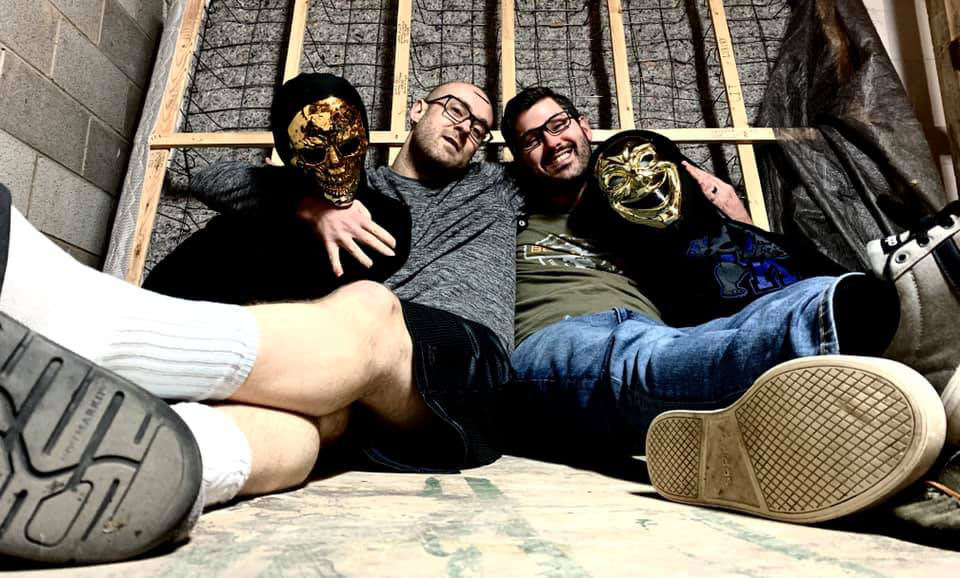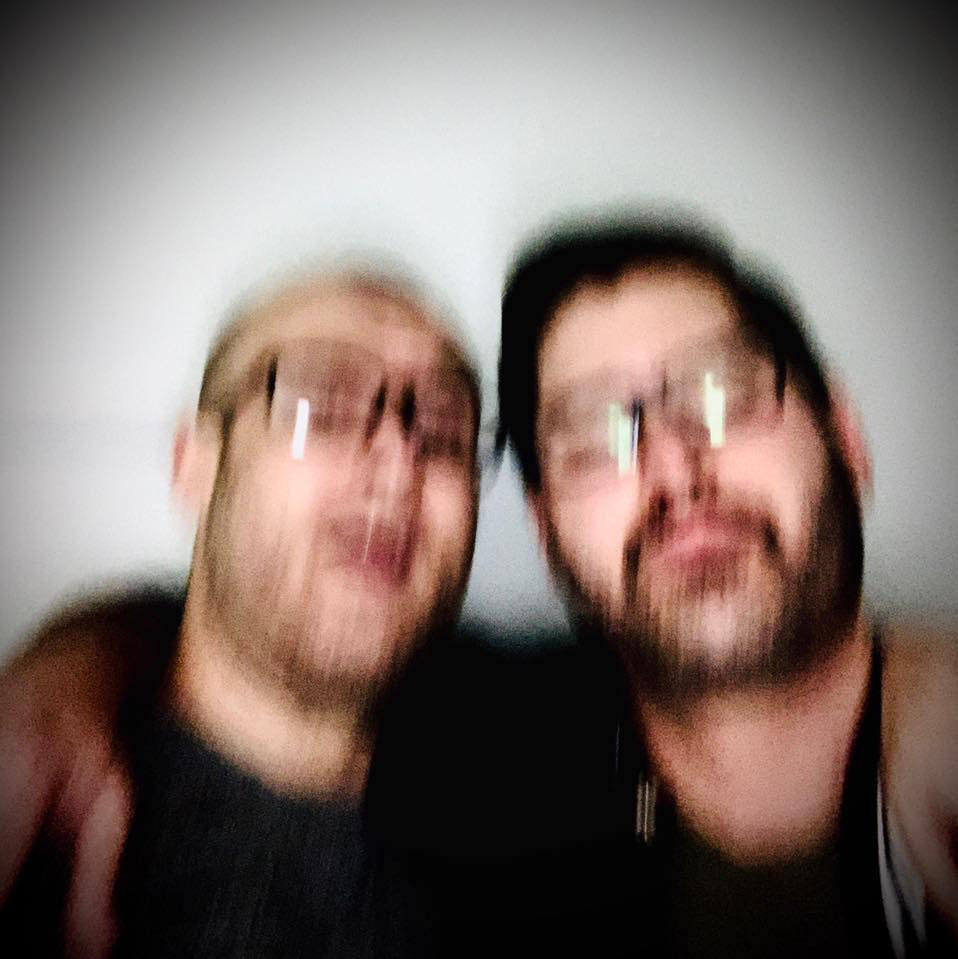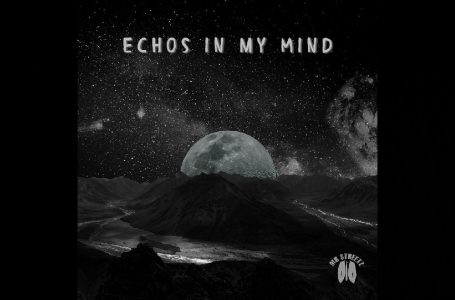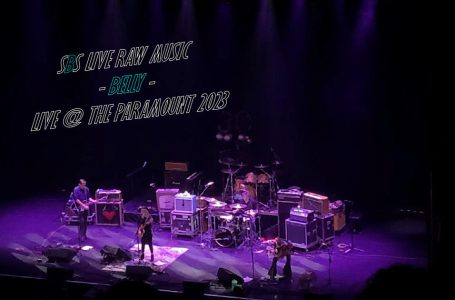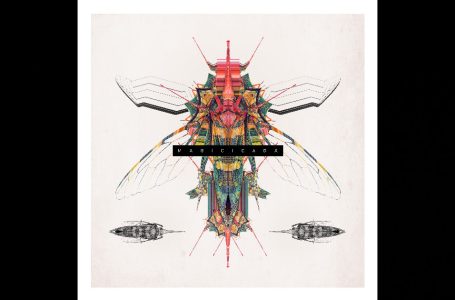The Key Of Green
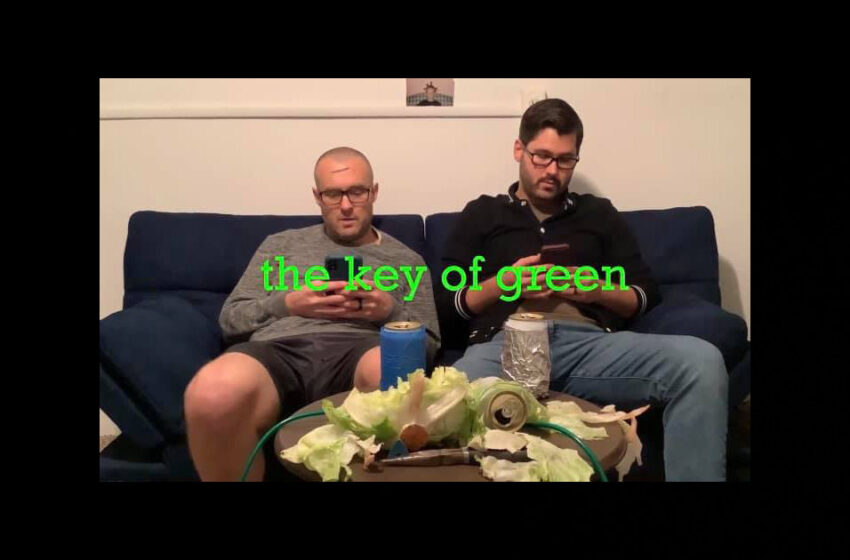
The Key Of Green Interview
SBS: Alright Charles…alright Evan…just because I might consider y’all family in The Key Of Green doesn’t mean everyone out there knows you as well as I do…yet! Let’s get an introduction to who ya are, what you’re all about, and how The Key Of Green came to be doin’ what it is they’re doin’ in music now today.
Charles: I am one of many creatures roaming around here. More specifically, I am one of the human variety. Narrowing it down a bit further, I am part of the percentage of humans that do music stuffs. I also do a bunch of other stuffs which, when combined, make me uniquely me. Now that we have reduced the equation down to one, let’s split that atom. I am one half of The Key of Green. The other half is Evan—a creature you could describe the same exact way as above.
Evan: I think who we are and what we’re all about is pretty simple. We’re just here with the main objective of creating the kind of thing we’d like to encounter out in the wild: adventurous music with lots of peaks and valleys, space for development, and little concern for traditional genre designations or song forms.
SBS: When you recorded your first record Metaphorical Fires, and your second, Precedence & The Silent Wheel…well…I suppose you almost had it easy in comparison to what you would have had to go through in order to make your third record, Bathos – is that fair to say? In terms of physical locations – half your band moved way far away! How did that change things in terms of the third TKOG album?
Charles: When that Evan guy moved, I barely noticed. He took a few weeks or so to get settled in, but other than that, it was business as usual in the world of Green Keys. That guy sends some stuffs to me, I send some stuffs to him, we mess with the stuffs, and somehow it ends up musical. Well, some may call it music. I do.
SBS: What about the material itself? Looking back on Metaphorical Fires & Precedence now…I mean, it’s really only been a short timeframe that all three of these records have even existed – but how do you feel like the music of The Key Of Green has been evolving over time & experience? What can you guys do now on a record like Bathos that you might not have been able to achieve on that first record?
Charles: If I remember correctly, I believe the first record was written, recorded, and mastered in five or so weeks—no more than six. The next two records were more like yearlong ventures, so there’s a lot more going on in comparison to Metaphorical Fires. Rocking through the process with longer projects, we have had more time to experiment, and for me, the experimentation is like a drug—I just can’t get enough. How far out left field can we go and still keep it together? It doesn’t matter—I want to go
further. Eventually there’ll be a fence and I plan to jump it. Home Run! Now get back in the batter’s box and start again…
Evan: I feel like we’re in competition with our former selves. Always trying to one-up those guys. And so far, present us: 2, past us: 0. Those guys fucking suck.
SBS: Now…word on the street is there’s much more of a story to “Antlers” than I went into during the review that I wrote! What can y’all tell us about this second cut on Bathos – what’s it really all about?
Charles: The evolution of “Antlers” began with a simple phrase—locking horns. It’s a relatively common thing people say, but I love the imagery it brings when I hear it so I decided to make some art with the stuffs. Writing lyrics, I went from “horns” to “antlers” because, well, “antlers” just sounds cooler. I also wanted to personify the situation a bit, so I decided the antlers would be “locked” because of marital strife. The story forms. The lyrics are accomplished. Antlers are locked and the deer can’t stand to look at each other. They fight. They fight. They fight. But when the sun goes down, and both are locked and scared of what the night brings, they kiss goodnight. Beautiful. Evan and I bounce around the stuffs for a few weeks. Eventually, we called it a song and released it. A few days later, my extremely beautiful and talented and amazing wife pointed out that the deer were gay. Only males have antlers. All of a sudden the song had a new meaning. Gay marriages go through strife because of backwards culture, but there’s plenty of kisses goodnight because the love is greater. And now that the music has had time to settle in, I can say this is my favorite track on the album. Also, Evan’s lead work here is something that the Library of Congress should deem culturally important. It’s that good.
SBS: I said something along the lines of how listening to this new record was like listening to people that had never even heard what music WAS before! And yet – you (rightly) didn’t get offended by that at all – you knew what I meant & you took it as the compliment it was intended to be (thank you!)! Maybe, if ya can…well…take a shot at this – can you describe why that was a positive, and not a negative for you? Exactly what IS music to The Key Of Green, from your own perspective? You have heard some, yes?
Charles: I’ve heard a song or two…just the singles (giggle, lol, hehe, snort, etc.). Really though, here’s how I see it and then I’ll be looking forward to Evan’s response out of curiosity. In other words, this is only my two cents. We take our stuffs seriously and we are both classically trained. When you master the classical theory “rules,” you know which ones you want to break. You break them and find a few more you want to break. Before you know it, you break them all. That’s my goal. And that’s why your
interpretation is a compliment.
Evan: Oh yeah for sure, theory rules are important and do kind of guide us a lot of the time but, in addition to knowing WHAT rules to break, it’s good to know WHEN to break them. In one section it may be best to fall in line and obey a particular rule, while the next section might benefit from blatantly defying that same rule. I think if you put music in a pot over high heat, you’d lose most of its elements to evaporation and be left with the sludgy relationship between tension and resolution. The more dynamic that relationship, the more interesting the music, so grab the damn spoon and stir that sludge baby!
SBS: Somehow I also stumbled onto something that I wasn’t aware of when I wrote the Bathos review, which is that you’re one of the extremely rare bands out there that approaches the craft of songwriting LYRICS FIRST? The natural question is, are you insane? The real question I want to know however, is what kind of unique challenges does this present along the way? There’s no possible way on earth this could be the easiest of methods…but how abstract is it? Is it as simple as looking at words on a page and imagining what the song could be around them? Is there some kind of vocal melody to guide Evan? Are there moments where you have to compromise & rewrite, like any other band would? Is it a method that always works out…or are there songs that never see the light of day because they just seem impossible to somehow adapt music to? Take us on a trip inside it all – how does this all work?
Charles: It’s not always lyrics first, but for me it usually is. I’d say that Evan dude also works this way about half the time. Am I wrong, E Doggg? Anyway, let’s look at it from a few perspectives. First, choral
composers rarely write their own lyrics. They adapt the “lyrics” or “poetry” or “folk song” or “whatever” to music. I love this way of thinking. Second, the process of writing a song is as much an art as the actual finished song. There are as many songwriting methods as there are possible songs. We have yet to dig into most of them. I want to grab ‘em like Halloween candy. Third, the music will “fit” the words because you want to represent them cosmically. Next, if you have a good rhythm to the way you are reading your phrases, all you have to do is add pitches. Riff rhythm—accomplished. I could go on and on. Long story short—we’re always doing things the weird way.
Evan: Yeah I think lyrics first is a fantastic approach that usually yields interesting results, even though it’s not always the easiest method. To me, lyrics represent logic and music represents emotion. We often think of logic and emotion as two opposing forces separate from each other, but I think it makes more sense to view them as interdependent. How we think affects how we feel and vice versa. Writing the music before the lyrics is like saying “here’s how I feel, now here’s what I think about it,” while
writing the lyrics first is like saying “here’s what I think, now here’s how I feel about it.” Both methods are equally good and equally human.
SBS: Is there a correlation between how much goes into writing songs, and how people listen to music? What’s the relationship between how much work is put in, and how much we might ‘get’ out of TKOG?
Evan: I certainly hope there is a correlation! We put a lot of thought into what we do and it would be a real kick in the dick to hypothetically discover that correlation had been an illusion.
Charles: I love the process. That’s why I do it. In the words of famous mid-eighteenth century philosopher Miley Cyrus “it’s the climb.” Evan and I have a connection because of the process, not the product. But in the end, the product is what’s left of the process. You need to make sure the process was thorough so you come out feeling confident about the product.
SBS: What was the most unique, or memorable moment for you during the recording of Bathos? Were there any particular breakthroughs you felt like you made as a band along the way this time around?
Evan: Nothing particular comes to mind, but overall I’m happy with the result of the “work hard, play hard” philosophy that we seem to commit to more and more with time. Like, striking that balance between intellect and dipshitery, that sweet spot between carefully composed melodies/harmonies
and singing about bullfrogs and Bowser.
Charles: It was an easy album. Stuffs went smoothly from one hand to the other. Our friendship goes way back yonder, but I never fail to be impressed by that Evan dude’s work. I think I can speak for us both when I say we just want to break boundaries, and so far, it has been a pretty successful endeavor. Gotta get back in the batter’s box…
SBS: This might be tough to pin down…but who would you say is the most comparable artist or band to the music of The Key Of Green? ‘They’ say it’s all been done before…so who would have paved the way for a band like yours to exist today? Is there any way to prevent influences from creeping into the art & music that we make, or is there any reason that we should actively try to prevent that from happening?
Charles: This is a loaded question and I like it. I’ll touch on some of it and let Evan finish up. As mentioned, we are both classically trained, but I was brought up on punk when that Evan dude was a metal gentleman. We have things in common and plenty of differences. But there’s one thing in common that drives our music—no matter the influence (or lack thereof), we take it to its extremest extreme musically and developmentally. So what bands do we sound like? A few that sound nothing like us come to mind. I won’t even mention them because I don’t think many others will make the connection and I’ll sound like an idiot. I may be too “inside the box” to truly even know what we sound like!
Evan: Charlie’s a huge 90’s dork and I’m a big progressive rock/metal nerd. Just to list my top five influences: Metallica, Iron Maiden, Between the Buried & Me, Punch Brothers/Chris Thile, Umphrey’s McGee. We never want to sound exactly like any of our influences and mostly like to keep them in the background of our music, but we’re totally fine with them occasionally creeping into the forefront.
SBS: As is my understanding…we’ve got Charles handling the lyrics & vocals…we’ve got Evan slayin’ the living daylights outta the guitar…and we’ve got…hmmm…there’s uhhhh…wait a minute…umm – hang on a second here – there’s a whole lot more to these songs of yours than just that – so how in the heck does the rest of the instrumentation get divided up? Where do these other sounds we hear come from?
Charles: Simply put, the stuffs’s all over the place. Evan handles guitars and I handle vocals. Anything else, it may be that Evan dude or it may be the artist presently known as Charles. We both find way too much fascination with drum programming. We both like to bounce around the dumbest of ideas just to see what can happen. I wish I would have kept all of Evan’s “bad” guitar playing text messages from the past two years. About once a week, he will make up an absolutely terrible riff and text it to me. They are better than any good riff could ever dream to be.
Evan: Haha the only thing I enjoy more than making music that I think might be good is making music that I know for sure is very, very bad.
SBS: When Evan chose to move across the country to a different state – how close was The Key Of Green to packing it all in? Was that ever even discussed – or was it simply a matter of adaptation & you knew the music would continue on? What’s going to keep you together now when you’re this far apart, and how often might you actually get to see each other physically in the flesh in an average year now?
Evan: My move down here to the beautiful and weird soggy undercarriage of the U.S. was, boringly enough, for my job. Of course the decision came after some time spent weighing pros and cons. And even though what Charlie and I do is greatly meaningful and fulfilling to me, the possibility of the move being detrimental to the band never made it on the list of cons, because I just knew it wouldn’t come to that. We were already doing everything remotely anyway, so nothing changed. That’s one of the advantages to being in a band that is strictly a “recording artist.” And as far as being able to hang out in the flesh goes, it definitely won’t be often enough, but I think the way in which we bond the most is through sharing things that we’ve written with each other, and that ain’t going anywhere.
SBS: I suppose while we’re thinking ahead, I should make sure to ask some standard music-journalist question about the future coming up. It IS important, of course…there’s really no way around asking about it gentlemen, you understand, right? So what’s in the cards for The Key Of Green for the future to come? I have already heard rumors & rumblings of new music already being created…any truth to that?
Evan: Oh yeah we’ve talked about album four and have laid out what we want to achieve with it. A big thing we want to focus on is creating more dynamic music: heavier heavies and softer softs.
Charles: We are currently working on a song called “A Mammoth Called Reliance” and it will be the greatest song that ever songed. And then after that, we will make a better one.
SBS: Wide open question for ya…what is something you can tell us about The Key Of Green that none of us would assume by listening to the music you make?
Charles: We are just as obnoxious as our music.
Evan: We’ve technically been a band for I think 14 years? Started as an acoustic duo then switched to air guitar until 2 years ago.
SBS: Over time…what would you like the musical legacy of TKOG to become? Obviously we’re not here forever, but the music we make will be…long after our bones turn to dust, people will still be spinning it. Is there some kind of cohesive thread you’re working into your songs & records that will reveal some grand master plan all along? Random tunes & random albums, nothing connected at all? Is it important for a catalog to speak just as strongly as any given record could – or is that all just pure luck of the draw? Is it always important to build on what you’ve done before? Should an artist’s or band’s current work always be their best work? How could anyone know until years later when they can look back on it all?
Charles: My friend and killer musician Richie Tipton once said I was a “lifer.” He had to explain to me what he meant. It’s someone that will make music until they die just because they are making music. It’s just what they do, for better or worse. To quote the great early-sixteenth century philosopher and historian Metallica—“Nothing Else Matters.” So yeah, that pretty much sums it up (Tipton is also most definitely a “lifer”). Whether or not I have a legacy, that’s not up for me to decide. And legacies are
fiction anyway. I’m not gonna be around for a legacy so how do I know the joys of my legacy? Moving on… both Precedence and Bathos were concept albums, but we didn’t even plan the concepts. It just kind of takes form after the second or third song and we grab ahold and ride.
SBS: What would you say stops a song by TKOG from hitting the cutting room floor? What does it have to have in order to make the grade and end up on one of your albums? How self-critical are you guys?
Charles: Again, this is just my perspective. There is never an idea that cannot be properly developed. It’s all in how you treat it. Treat each creative sprinkle like the next Britney Spears hit. Oh, she’s not cool anymore? My bad. Anyway, nothing ends up on the floor.
Evan: Britney Spears isn’t cool anymore? Take that one up with my wife and therefore with me too! Anyway, I am with Chuck about literally ANY idea having at least some value. It may need a lot of development and may end up barely resembling its original form, but the only idea that gets tossed out
is a previous draft of a final one. Always recycle.
SBS: I gotta say guys…I’ve been stoked about how The Key Of Green has been progressing and how the music has continually pushed forward creatively & artistically…it’s involved, intricate, and authentically interesting stuff, and it’s been a pleasure to witness this band grow from day one. Hopefully the answer about the future of your music indicates many more albums & songs still to come…because I feel like somehow, the best is still yet to come from The Key Of Green, even with all the awesomeness you’ve so generously supplied us all with already, up to & including the new album Bathos, of course. Anyhow, I’m sure you get the point – I’ve been a sincere fan since y’all first started pumping out tunes, and I ain’t going anywhere anytime soon…I’m here for this ride that The Key Of Green is taking us on, wherever it might lead to next. So many, many thanks to you both for taking the time to do this interview…thank you for the incredible music you’ve been making…and cheers to this new year ahead Charles & Evan – go kick some ass all over it! We always end with our traditional open floor…a space where you can say anything you’d like to, because no set of questions I could ever ask will ever cover it all. So I do the right thing, and shift the potential blame to you if anything got missed out…because you’ve got the opportunity to say whatever you’d like in this next space right here. Pressure’s on now! You guys rock – for real – it’s been fantastic to listen to you evolve, and I look forward to many more years of that ahead – all the best to you both – the floor is officially yours – you’ve got the last word here guys, have at’er.
Charles: I love Sleeping Bags. There is no bad music. I miss my old friend Vampire Mike. Broccoli is better raw—I won’t even touch it if it’s been cooked.
Evan: Jeremy, we really appreciate you taking the time to review our stuff and ask us these thoughtful questions about ourselves. I’ll let this last word be in support of BA (Butt Awareness): Butts, even though they can be gross, are good.
Find out everything you need to know about The Key Of Green from the official links below!
Instagram: https://www.instagram.com/thekeyofgreen
Spotify: https://open.spotify.com/artist/7rdHOgyodeuLmIU7eiWKCA
Apple Music: https://music.apple.com/us/artist/the-key-of-green/1499197749
YouTube: https://www.youtube.com/channel/UCCRXM8hVKWopCgEvg8omdDA
Find out what we do at sleepingbagstudios, and be the next to be featured on our pages by clicking here!


